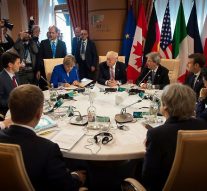
The EU struggle with US unpredictability
Employment and Social Affairs 4 June 2017The summit of G7 nations in Taormina could mark a historical change in transatlantic relations. The traditional role of the United States of America was not as usual a leading one, as over the past years normally highlighted those meetings. US president Donald Trump acted as a real unpredictable actor: for the first time in G7 summit we assisted to a “one man show” with Trump against the leaders of Germany, France, Britain, Italy, Canada and Japan on several issues. Even if this quite hostile stance could change in the next days opening the way to some change of position by US president on some issue, the unpredictability that is characterizing Washington administration seems to prevent a fruitful transatlantic cooperation. If this is a negative change for many issues, on the other hand this situation could serve for the EU in order to develop more strongly its own role on the international scenario.
On security related issues the only common point reached was the G7 Taormina statement on the fight against terrorism and violent extremism. But on to many concrete security issues there was no real common understanding, except for Trump calling the Allies for more defense spending.
Regarding the Syrian war, leaders called for and end of the conflict through an inclusive Syrian-led political process under the auspices of the UN; the G7 addressed the situation in Lybia, urging to advance on the path of political dialogue and national reconciliation; they called on North Korea to abandon all nuclear and ballistic missile programs in a complete, verifiable and irreversible manner. Maybe on Russia there was a stronger stance: they recalled that the duration of existing sanctions is clearly linked to Russia’s complete implementation of Minsk agreements and its respect for Ukraine’s sovereignty. In any case it seems not enough.
On migration there were not too many expectation and thus there was not a big surprise if the final declaration include just some formula and stress that “they also acknowledged the right of states to control their own borders and to establish policies in their own national interest”. In the end leaders reached some agreement and reiterated their commitment to keep markets open and to fight protectionism, while standing firm against all unfair trade practices. They committed to adopting appropriate policies so that all firms and citizens can make the most of opportunities offered by the global economy. But at the end of the day on globalization and free trade, despite some common point, there are still huge distance.
In this scenario it is maybe on fighting inequalities that there was some stronger common stance by the Seven leaders: they agreed to strengthen the capabilities and resilience of economies and communities to adjust to the pace of change, so that the global economy works for everyone and in order to reach an inclusive growth. Furthermore in conjunction with Taormina Declaration another goal set by the G7 leaders is the G7 People-centered action plan on innovation, skills and labor.
It is aimed at highlighting an integrated policy agenda, so as to allow people and firms from all sectors to take full advantage of the benefits of innovation and, in doing so, to magnify our efforts to make innovation a concrete source of prosperity, competitiveness and well-being for all regions of our countries.
And G7 leaders adopted, in line with the principles endorsed in the Taormina Declaration, a Roadmap for a gender-responsive economic environment.
This document focuses on the structural policies falling within our central governments’ jurisdiction that are likely to have the greatest impact in delivering gender equality through enabling women’s labor force participation, entrepreneurship, economic empowerment and thus their full and equal participation in society. The key objective are: increasing women’s participation and promoting equal opportunities and fair selection processes for leadership at all levels of decision-making; Strengthening the foundation of women’s access to decent and quality jobs; Eliminating violence against women and girls throughout their lives.
It could be said that Taormina G7 – at the end of the first travel abroad for US president – was a crucial test to understand after five months Trump real face. And the outcome is that is still not clear, with a uninterrupted sense of unpredictability coming from the US. European Council President Donald Tusk remains optimistic about transatlantic relations despite the unwillingness of Trump’s administration to commit to the Paris accord on climate change and on other crucial issue. “My impression after the G7 meetings is more optimistic than I expected, including with our new partners around the table, especially President Trump,” Tusk said on a panel at the Globsec in Bratislava adding that there is a need for more time to see the final decision by Donald Trump on many issues. Even if this could be true, Germany seems to lead now a reaction provoked by Trump’s stance. Speaking at a campaign event held in Bavaria, the German Chancellor Angela Merkel said: “We Europeans must really take our destiny into our own hands. The times in which we can fully count on others are somewhat over, as I have experienced in the past few days.”



